Economic and green transitions: lessons learned from the Forum Aix-Marseille
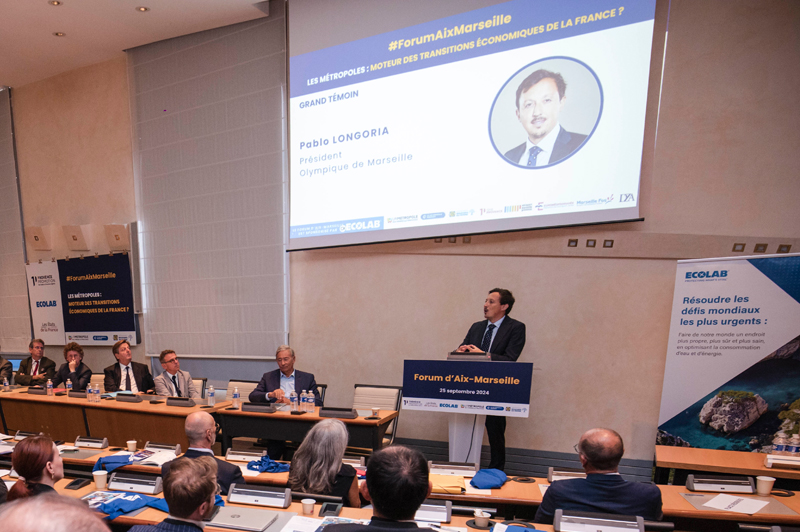
How are metro areas shaping the future?
According to the EY barometer, 40% of new business projects and jobs created in France by international investors are concentrated outside of traditional business capitals. At the same time, France as a whole benefits from tremendous economic stability and financial incentives, such as its best-in-class Research Tax Credit (CIR) system. This means French metro areas have an enormous economic appeal, and several factors are making them even more attractive to talent and investors: innovation, synergies between different stakeholders, and long-term visions for the future. These were the issues at the heart of the third edition of the Forum Aix-Marseille economic conference that was held on September 25, 2024 at the Chamber of Commerce and Industry Aix-Marseille-Provence.
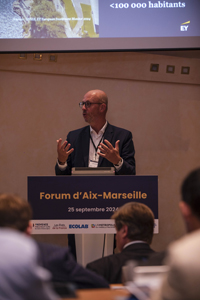 To explore the question of how metro areas are driving the economic transition in France, the Forum Aix-Marseille brought together numerous CEOs and business leaders from major international companies in the healthcare and industrial decarbonization sectors. These are two fast-evolving domains where metro areas play an essential role.
To explore the question of how metro areas are driving the economic transition in France, the Forum Aix-Marseille brought together numerous CEOs and business leaders from major international companies in the healthcare and industrial decarbonization sectors. These are two fast-evolving domains where metro areas play an essential role.
“One of the distinguishing aspects of the Aix-Marseille-Provence metro area in terms of foreign direct investment is that it registers more new company creations than expansions. In the national context, this represents a genuine exception and means the territory is enjoying a more rapid economic renewal,” explained Marc Lhermitte, a Senior Partner at EY. During his presentation of the consultancy’s France 2024 Attractiveness Survey, he also highlighted that fact in 2023, numerous new business projects were drawn to Aix-Marseille because of the metro area’s strategic location at the crossroads of Africa and Europe.
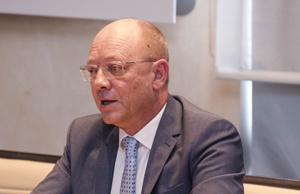 Meanwhile, Fabrice Coquio, the Managing Director for Digital Realty France, emphasized the significant role the telecommunications sector plays in attracting new investment. Thanks to its subsea cable connections and data center infrastructure, Marseille is poised to become a global Top 5 hub for data traffic. “There are three cities in the world that benefit from such a geographical advantage: Miami, Singapore, and Marseille. However, Marseille is currently experiencing the strongest growth, with an increase of around 40-45% in data exchanges per year. That’s why, after having invested €500 million, we plan to invest a further €1 billion within the next two years,” said Fabrice Coquio. He added the company is addressing concerns about the environmental impact of data centres, noting that three Digital Realty data centers in Marseille are equipped with a river cooling system, a green innovation using underground water that is 30 times more energy efficient than traditional cooling solutions.
Meanwhile, Fabrice Coquio, the Managing Director for Digital Realty France, emphasized the significant role the telecommunications sector plays in attracting new investment. Thanks to its subsea cable connections and data center infrastructure, Marseille is poised to become a global Top 5 hub for data traffic. “There are three cities in the world that benefit from such a geographical advantage: Miami, Singapore, and Marseille. However, Marseille is currently experiencing the strongest growth, with an increase of around 40-45% in data exchanges per year. That’s why, after having invested €500 million, we plan to invest a further €1 billion within the next two years,” said Fabrice Coquio. He added the company is addressing concerns about the environmental impact of data centres, noting that three Digital Realty data centers in Marseille are equipped with a river cooling system, a green innovation using underground water that is 30 times more energy efficient than traditional cooling solutions.
Encouraging R&D in healthcare to advance French economic sovereignty
As part of the discussions on the economic transition, the Forum Aix-Marseille focused its first round-table discussion on sovereignty in the healthcare sector by examining how multinational companies are collaborating with metro area hospitals to develop local solutions.
In his remarks, François Crémieux, the director of the AP-HM public university hospital system in Marseille, underlined France’s exceptional appeal in terms of healthcare, which is partly due to the country’s commitment to financing a system based on solidarity so everyone is guaranteed high-quality care. “France’s public services, particularly in the hospital sector, are an asset for the territories and for attracting major global companies,” noted François Crémieux.
Three areas of development were cited as levers to strengthen Aix-Marseille’s international standing and establish the metro area as a leading territory for healthcare transitions: integrating clinical activities with fundamental research, intensifying collaborations between public and private stakeholders, and taking a holistic approach to the entire value chain.
One way the French government is boosting regional healthcare systems is through the national biocluster program. The Aix-Marseille-Provence metro area has received a €97 million grant to help establish the Marseille Immunology Biocluster (MIB), which will prioritize an increase in the number of Phase 1 and Phase 2 clinical trials. Olivier Guitard, who is the Managing Director for Southern Europe for Sartorius, a German company that is a top supplier to pharmaceutical laboratories, says initiatives like these are making Marseille a world leader in immunology.
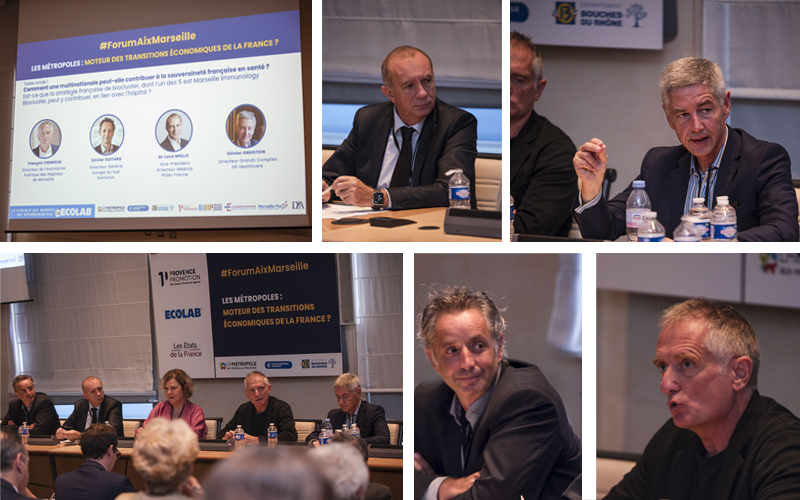
Dr. Luca Mollo, Vice-President and Medical Director of Pfizer France, which is conducting 76 clinical trials in France representing an investment of almost €35 million, spoke of the effectiveness of public-private partnerships in developing innovative therapies. Pfizer, which markets 100 compounds, vaccines, and medicines in France, also supports academic research, particularly basic research, via investment funds. “We are banking on university research units, start-ups, and companies throughout France, and we have announced investments in the neighborhood of €1.5 billion euros to strengthen French R&D as well as pharmaceutical production,” said Dr. Luca Mollo.
In terms of investment in the ecosystem, the American tech accelerator and venture capital firm Plug and Play once again expressed its desire to work in Marseille and applauded the biocluster project. Fabian Scheugenpflug, the head of the company’s Tech Center in Munich, said: “We firmly believe in open innovation in the healthcare sector even though it takes 10 times more investment to launch a biotech than any other type of technology company. We’re interested in Marseille’s biocluster strategy because it will pull together an entire ecosystem and boost its overall progress.”
Olivier Oreistein, Executive Sales Director at GE Healthcare, the world leader in medical technologies, outlined the company's contribution to France’s healthcare sovereignty, which includes a major production site located in France and the employment of 600 French researchers. He also cited the company’s partnership with the Marseille hospital network to upgrade its imaging equipment. “This unprecedented agreement with AP-HM is beneficial for both parties," said Olivier Oreistein. "It enables us to develop technologies and new practices in close collaboration with exceptional, internationally renowned medical teams and professionals who are particularly open to providing training to facilitate the integration of our equipment into care pathways.”
Paving the way for the green transition in the industrial sector
At the second round table focused on decarbonization, Alain Becoulet, ITER's Deputy Director General, made it clear that society was facing an important challenge: “Decarbonization is not an option, it’s not a trend, it’s a necessity for humanity. It’s going to take a very long time, and it’s going to be very expensive. It’s the biggest investment the planet is going to make this century,” he said.
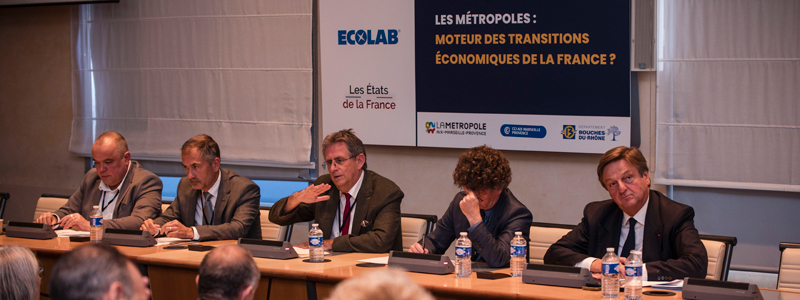 Alain Becoulet added that it was urgent to decarbonize energy production as much as possible using existing sources such as wind power, photovoltaics, hydroelectricity, and conventional fission nuclear power, which alone accounts for around 70% of France's electricity production. This nuclear power is appealing to international companies as it enables them to benefit from stable, competitive electricity prices at a European level. The long-term possibilities for nuclear energy are even more intriguing thanks to ITER, an international project launched in 2006 in Provence that aims to demonstrate the feasibility of nuclear fusion so that fusion power plants can be built and generate low-carbon energy within the next few decades.
Alain Becoulet added that it was urgent to decarbonize energy production as much as possible using existing sources such as wind power, photovoltaics, hydroelectricity, and conventional fission nuclear power, which alone accounts for around 70% of France's electricity production. This nuclear power is appealing to international companies as it enables them to benefit from stable, competitive electricity prices at a European level. The long-term possibilities for nuclear energy are even more intriguing thanks to ITER, an international project launched in 2006 in Provence that aims to demonstrate the feasibility of nuclear fusion so that fusion power plants can be built and generate low-carbon energy within the next few decades.
Jean-Michel Mercier, Chairman of Infineum France, a joint venture between Shell and ExxonMobil that specializes in additives for the automotive industry that is based in Berre l’Etang in the Aix-Marseille-Provence metro area, spoke of the investments required for future operations: “To ensure our transition, we need to evolve our business model and invest in new, more sustainable technologies such as carbon capture, biofuels, and electricity. After many years of reducing our energy consumption and upgrading our production processes, we need to consider investing differently, in partnership with consortiums.”
Decarbonizing also means investing financial resources in water optimization and treatment, all the more so in water-stressed zones such as the South of France. “In factories, when we save water, we also save energy. A manufacturer can achieve water savings of up to 80% in their facilities. This investment is vital today and there will be an enormous need in the context of new projects that are being developed, notably in the hydrogen sector,” explained Thierry Troudet, President of Ecolab France.
Jean-Luc Allavena, a partner at Apollo Global, one of the world’s largest investment funds with $700 billion in assets, said that funds are changing because of the huge sums needed to finance decarbonization. “Over the last few decades, funds have acquired long-term resources, notably through life insurance, sovereign wealth funds, and, more broadly, savings with a view to financing major industrial projects with lower but secure returns. This can be the case in the energy sector where revenue flows may be guaranteed by long-term contracts.”
These types of financing mechanisms can be integrated into emerging projects in low-carbon industrial zones supported by the French government, such as the one in Fos, which also includes Étang de Berre and Gardanne. New low-carbon initiatives in this zone are arising from studies conducted under the direction of the PIICTO industrial innovation association in collaboration with a collective of companies. For example, the Syrius program aims to identify strategic guidelines and priority technologies to accelerate the decarbonization of industry. A number of projects are already being considered by the Aix-Marseille-Provence Metropolis and are well on the way to creating the industries of the future.
In conclusion, the dynamic nature of French metro areas such as Aix-Marseille-Provence is reflected not only in their ability to attract international investment and innovate in key sectors such as healthcare and industrial decarbonization, but also in their central role in global economic transitions. Thanks to public-private collaboration strategies and ambitious initiatives such as bioclusters and decarbonization projects, these territories are positioning themselves as drivers of France’s international competitiveness and national economic sovereignty.


 +33 4 96 11 60 00
+33 4 96 11 60 00




